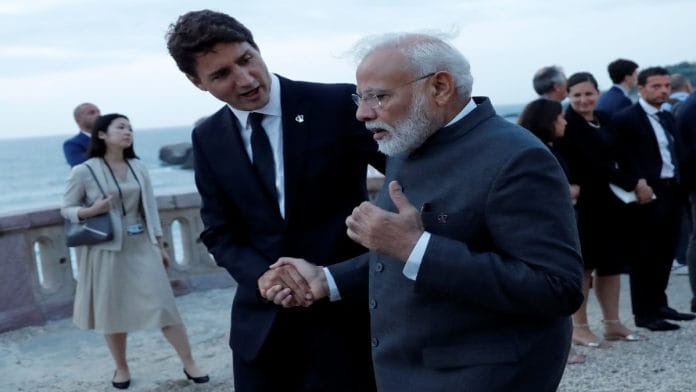New Delhi: Seeking to overcome their strained relations over the last few years, India and Canada have decided to take their bilateral relationship to the next level with plans to enhance security, defence and trade ties under Prime Minister Justin Trudeau’s third term.
In an exclusive interaction with ThePrint, India’s High Commissioner to Canada Ajay Bisaria said the countries are undertaking “fresh initiatives” in order to have “greater coordination” in a changing geopolitical environment.
In September 2021, Trudeau won a historic third term as Canada’s prime minister. “With a new government in place in Canada, we are looking at fresh initiatives in the new year. We hope to move towards greater coordination between our two G20 economies and Indo-Pacific democracies. We can expect deeper economic, security and defence cooperation between India and Canada,” Bisaria said.
He also said on the strategic front, Canada is expected to release its Indo-Pacific policy in the next few months, which is expected to bring both countries closer in terms of a larger geopolitical alignment.
“The two countries share pretty similar views on the dynamics in the Indo-Pacific. India also keeps briefing Canada on its vision of the Indo-Pacific, given its position as a sister democracy in the region. Overall, both sides are looking towards a great deal of political, strategic and security convergences,” Bisaria said.
Earlier this week, India had joined the US, Canada, Australia, Japan and Korea to participate in a multi-national exercise, ‘Sea Dragon 22’, which is currently underway in the Indo-Pacific with a focus on anti-submarine warfare.
Also Read: Trudeau backs farmers protest, but Canada has always challenged India’s farm subsidies at WTO
Interim trade deal likely this year
On bilateral economic relations, Bisaria also said that in 2022, India and Canada are “hoping to make major headway towards an interim trade deal” which will eventually lead up to a full-fledged Comprehensive Economic Partnership Agreement (CEPA).
“Technical-level talks have started in 2021. The commerce ministers have discussed this issue recently and experts are expected to soon hold formal negotiations,” he added.
Formal negotiations for having a CEPA between India and Canada had begun in 2010, but talks have remained inconclusive due to differences over market access and tariff reduction issues.
Two-way merchandise trade between Canada and India had reached $10.1 billion in 2019, but, owing to the Covid-19 pandemic, decreased to $8.7 billion in 2020, according to official figures.
Security and defence cooperation
After experiencing a difficult period in relations during Trudeau’s first and second tenures, New Delhi believes that under the Trudeau administration’s third term, Ottawa will take a decisive “India direction”, a top-level source told ThePrint.
The bilateral ties had hit nadir when Trudeau’s India visit in February 2018 was not given much importance by the Narendra Modi government.
However, with Ottawa not recognising the so-called ‘Punjab 2020 Referendum’, promoted by pro-Khalistan group Sikhs for Justice (SFJ), a banned outfit in India, the bilateral relationship between both countries is poised for a reset of sorts, the source added.
Last November, a three-member team of the National Investigation Agency (NIA) had visited Canada to investigate the funding routes of the SFJ and other pro-Khalistan groups.
While the NIA has urged the Canadian government to declare SFJ as a terrorist entity, it has also agreed to share “actionable intelligence” with the Royal Canadian Mounted Police (RCMP), the source said.
The source also said both the NIA and Canada’s National Security Information Network (a wing of the RCMP that deals with national security and terrorism) have decided to get a regular dialogue mechanism going against the pro-Khalistan groups present in that country.
At the operational level, there is going to be greater coordination, the source said, adding that Canada, being part of the Five Eyes alliance, will also help India in gathering intelligence not just on pro-Khalistan groups but also on Pakistan-based terror networks.
“India’s main concern is Khalistani sympathisers. The extra tolerance that they enjoyed from the Canadian government is now changing. Canada is being made to understand the need to not encourage these elements and how this is a major concern for India also because these are backed by Pakistan,” the source said.
Talks are also going on about whether Canada can become part of the Quadrilateral Security Dialogue or Quad, currently consisting of the US, India, Japan and Australia.
(Edited by Gitanjali Das)
Also Read: Khalistan issue has no traction left in Canada, just like in Punjab, says Indian envoy Bisaria






